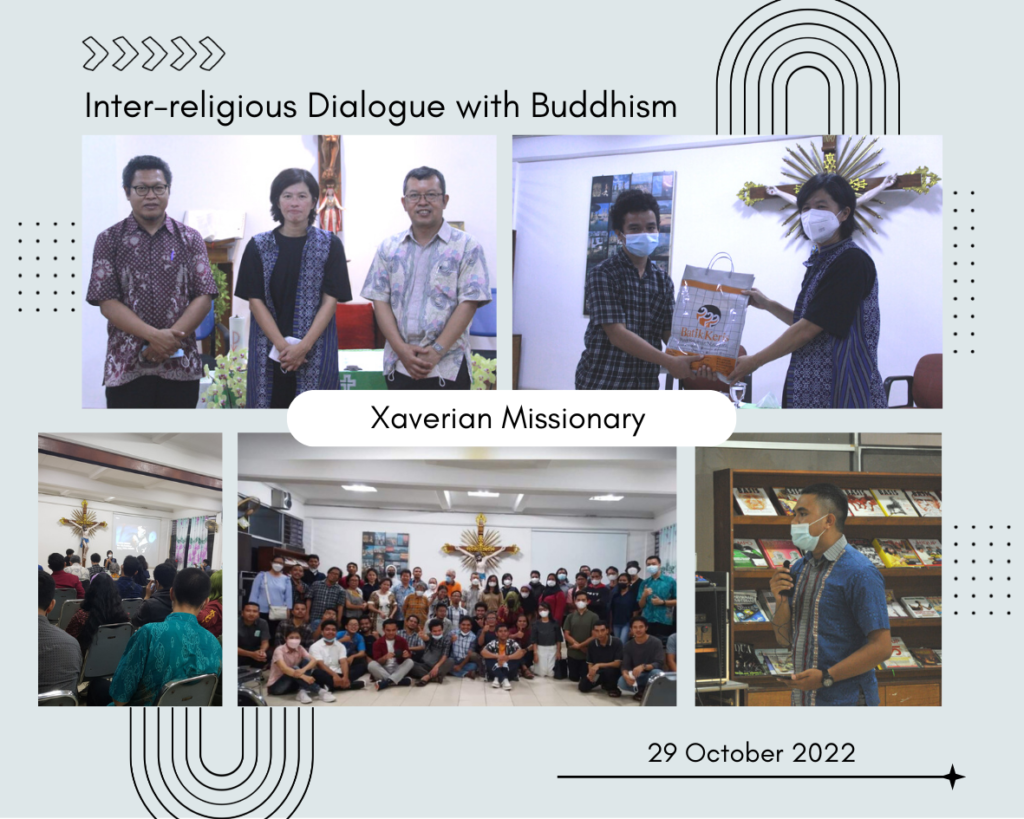Interfaith Dialogue with Buddhists and our Seminarians in Indonesia
Stanislas Fritz Prasetyo sx
“Buddhism and its relevance in the modern world” was the topic of the interreligious dialogue activity held by the Xaverian Philosophy Community of Jakarta on October 29, 2022. Since the COVID-19 pandemic, interreligious dialogue has been carried out through zoom meetings. For the first time after the pandemic, we were able to carry out this activity in our presence, at our home.
The difference is felt when there is an encounter in interreligious dialogue. The guess was Mrs. Ferlina Sugata, a Buddhist teacher from Maranatha University, Bandung. She also has expertise in the field of general architecture and the architecture of Buddhist temples or stupas. Furthermore, she has given several seminars and got many awards.
This event was attended by around 70 people including Xaverians and was arranged by Gregorius Yoristo Paranda SX (Xaverian philosophy student) as moderator. At the beginning of the activity, the rector of Xaverian Community, Fr. Sudarmanto, SX gave the opening speech. He highlighted the spirit of the kinship of the dialogue, and its contribution to enriching diversity, especially ahead of the political year and the presidential election. “Through this dialogue, we are all grateful for the gift of brotherhood. Even further, dialogue is an attempt to realize the hope of St. Conforti: Make the world one single family.
Understanding Buddhism
Mrs. Ferlina explained that the concrete situation of technology helps people. Many things have been taken over by robots, machines, and technologies. People can be more productive doing other things. For example, for marketplace customers, you don’t need to come to the store, just open the marketplace application and buy it. No exception, Buddhists have used technology for religious teaching activities. In collaboration with Osaka University, Japanese Buddhists created an AI (Artificial Intelligence) robot that can explain Buddha’s teachings in detail and also can answer questions.
Unfortunately, technology cannot solve all the problems in this world. Mrs. Ferlina asked the audience “Does the advancement of technology make humans free from feelings of sadness, worry, fear, and anger?” Then she said, “Of course not, the problem is still there. This is where the Buddha’s teachings are very relevant for dealing with emotions and suffering that cannot be solved by technology”. We will experience suffering continuously because we are just dodging and avoiding. If we do not understand ‘Why am I suffering? Why did I suffer?’ and we do not want to understand, we will suffer continuously. According to the Buddha, suffering is a conflict between desire and reality.
In studying Buddhism, three things must be done: 1. Pariyatti Dhamma – studying the Dhamma in theory, by listening and reading the Tripitaka; 2. Patipatti Dhamma – applying/practicing the Dhamma in daily life 3. Pativedha Dhamma – analyzing life experiences with meditation to realize absolute freedom. The result of this research must reach the stage of Pativedha Dhamma for one to reach the stage of wisdom.
Suffering in Buddhism is called Dukkha (“DU” means difficult; “KHA” means endure). It can be called a burden that is difficult to bear/hold. More deeply, there are five elements of attachment that the Great Teacher Buddha avoided, namely: attachment to physical form, feeling, perception, mind, and consciousness. If we are always shackled by these five things, suffering will dominate our lives. To get rid of Suffering (Dukkha) and attain enlightenment there is the Buddha’s eightfold path: right understanding, right thought, right speech, right action, right livelihood, right effort, right mindfulness, and right concentration.
Xaverian Missionaries as pioneers of dialogue in Indonesia
Buddhism is one of the oldest religions in the world, even before Christianity emerged. In the history of the Indonesian nation, many Buddhist-style kingdoms produced extraordinary historical relics such as the Borobudur temple. Nostra Aetate art 2 explains that in Buddhism itself, as well as in other religions, there is a light for the world. “The Catholic Church rejects nothing of what is true and holy in these religions. It has high regard for the manner of life and conduct, the precepts and doctrines which, although differing in many ways from its teaching, nevertheless often reflect a ray of that truth which enlightens all men and women” (NA, 2). Also during formation time, Xaverian students continue to train themselves to be open missionaries and go out to get to know non-Christian brothers and sisters.
Dialogue events held by Xaverian are always awaited and make our Xaverian community ‘proud’. These activities are also accompanied by sessions of Q&A (question and answer), and end with sharing dinner. The whole series of events has strengthened further relationships between people, even though they are of different religions. We hope and pray that all of them aim to realize the dreams of our Founder, Saint Guido M. Conforti, “to make the world one single family in Christ”.



